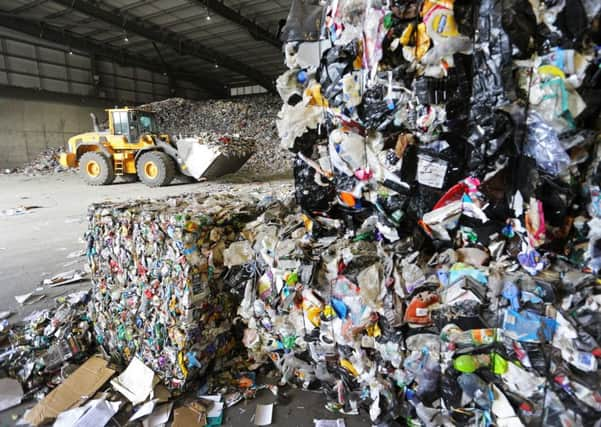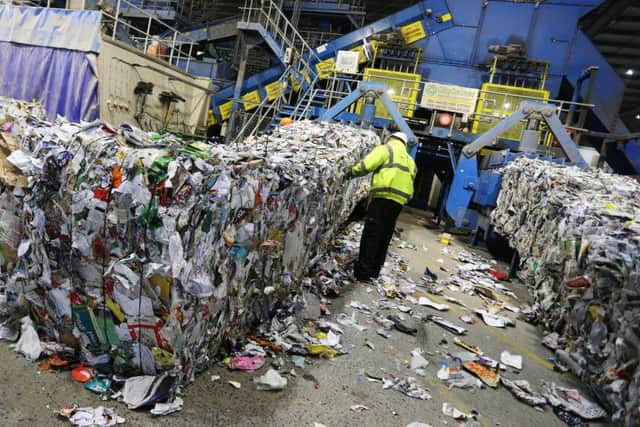Shinning a light on Sussex’s recycling challenge


From the start of this month, West Sussex County Council introduced a whole new range of items which can be included in the county’s blue-lidded, green recycling bins.
It’s all part of a drive to slash the amount of rubbish being dumped at landfill sites – a move which the county council hopes will not only make West Sussex a greener place to live but will also reduce the burden on the tax payer by cutting down on the amount of cash spent paying for costly landfill charges.
Advertisement
Hide AdAdvertisement
Hide AdDavid Barling, the council’s cabinet member for residents’ services, has welcomed the move but admitted that, at this stage, it was too early to tell what the uptake from residents would be like.


Speaking to the Herald and Gazette at the £15million Materials Recycling Facility, run by waste contractors, Viridor, on Ford Airfield, he admitted there were still hurdles to overcome.
“There will be substantial benefits to residents because it means less going to landfill.
“Our aspirations are that by 2020 we should be recycling 50 per cent of waste collected and by 2031 our aspiration is to have virtually none going to landfill.
Advertisement
Hide AdAdvertisement
Hide Ad“They’re huge targets but we do have the team to achieve them,” he said.
Last year alone, the recycling facility processed a staggering 67,583 tonnes of the county’s recycling waste.
However, it’s predicted that this figure could now be dwarfed thanks to the changes in what people can place into recycling bins.
As part of the shake-up, residents can now place plastic containers such as yoghurt pots, ice cream tubs, fruit and vegetable punnets and ready meal trays into their household recycling collection alongside plastic drink, detergent and bathroom bottles.
The only requirement is that they are clean, dry and loose.
Advertisement
Hide AdAdvertisement
Hide AdAll of that waste from across the county is then transported to the state-of-the-art facility in Ford which mechanically sorts the different types of materials.
A crack team of 30 people work night and day to keep the site operating smoothly.
The factory uses a range of conveyor belts to carry the loads to specially designed sorting machines.
The first stage sees all the material being weighed and poured into an enormous ‘hopper’ – a large container.
Advertisement
Hide AdAdvertisement
Hide AdThis then filters all the material onto a pre-sort line conveyor belt which carries the waste across the factory floor into a pre-sort cabin.
Inside here, three people manually inspect the materials to make sure everything coming into the facility is up to scratch.
Once the checks are completed, there is a complex phase of sorting the rubbish, which, for the most part, is entirely automated.
Recycling is sorted by size in an enormous fan-like machine known as a trommel.
Advertisement
Hide AdAdvertisement
Hide AdPlastics cans and papers are then transported to a ballistic separator which further divides plastics and cans from papers and card.
A series of electromagnets are then used to separate all the steel items from the aluminium cans.
Optical sorters complete the final phase of sorting by shining a light on the passing material which bounces off of plastic items.
Computers then process this data and activate a series of air jets to blast that plastic up to another belt.
Advertisement
Hide AdAdvertisement
Hide AdOnce all the materials have been divided, a team of about ten people check them over before sending them off to be squashed into solid blocks called bales.
These are sent away to be shredded into small chips.
The chips are then passed on to manufacturers who melt them down and reprocess them into new goods and products for people to use again.
Impressively, the factory can sort through about 16 tonnes of waste every hour.
Mr Barling said: “The whole operation is very smooth and sophisticated and very 21st century. It’s very technically advanced.”
Advertisement
Hide AdAdvertisement
Hide AdHe added: “Plastic pots, tubs and trays take an extremely long time to break down, often sitting in landfill for years without showing the smallest signs of decay.”
One of the biggest challenges the council now faces is changing people’s attitudes towards recycling.
In a bid to improve this, the authority has been working alongside district and borough councils to produce a range of leaflets and education material which will be posted to households.
Hannah Rogers, waste service manager for the county council said that 65 schools from across the county, and more than a dozen community groups, had taken part in an engagement and education sessions at the Ford recycling facility over the past year.
Advertisement
Hide AdAdvertisement
Hide AdShe explained the council was keen to continue this in the coming months, adding: “Education is key. Obviously children are the up and coming generation. We teach them, they then feed that back to their parents.”
County councillor Stephen Hillier, who has responsibilities for recycling, said in order to make the council’s ambition of no longer sending waste to landfill in 15 years’ time a reality, everyone would have to play their part.
However, he admitted that recycling could be a ‘very challenging and very complex area’ to understand.
But he added that ultimately, by reducing the reliance upon landfill sites, residents and the council would be better off, both economically and environmentally.
Advertisement
Hide AdAdvertisement
Hide Ad“If we don’t hit those recycling targets, it’s going to hit residents directly in the pockets through increased landfill charges and also potentially huge EU fines coming down the road.
“So we have got to do our best to educate them and make it much more of a shame if you don’t bother to recycle.”
For more details, see here.